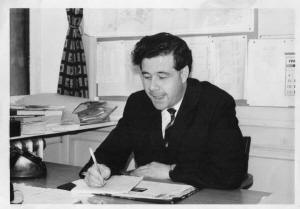Obituary by Vivien Sidlin, David Wands and Catherine Wands, in consultation with Bert Gallon
Graham Carson Wands, our Dad, was born on the Shetland Isle of Yell, a son of the Manse, on 19 March 1993, and his father, who had been a medical orderly in the First World War, was an army padre during the Second World War. Dad was educated as a border at McClaren High School in Callander and then attended Bredalben Academy in Aberfeldy, the family having moved to the Scottish mainland by this time. It was during his schooldays that his life-long love of rugby developed. He spent his National Service in the RAF, mainly in Malta, as a radar engineer, and during his time there he had taken part in a special parade during Queen Elizabeth’s visit to Malta in 1954. He enjoyed his time in the Mediterranean so much that he extended his National Service by signing up for a further two years. At the end of his time in the RAF he joined the BBC as a transmitter engineer, and he worked for the BBC for the next 33 years.
Dad was initially based at Kirk O’Shotts, the main television and FM radio transmitter for central Scotland, and later moved to Stagshaw where he was part of the two-man transmitter maintenance team responsible for the newly constructed network of unattended low power MF radio stations in part of the north of England and Scotland. It was the start of his involvement with the programme of transmitter automation and, by the 1970s, then based in the Technical Services Section of Transmission Head Office in London, he was playing a major role in converting the older manually operated stations to unattended working, and being a key member of the team that developed the Monitoring and Information Centres. Known as MICs, they were an essential part of the automation programme. Bert Gallon described our Dad as a highly-skilled engineer, a team-player, whose approach was methodical and organised, and staff who worked for him were always very clear about their roles and what was expected of them. One of the members of this team who worked for Dad, David Russell, told us that he had worked for many BBC engineers and managers in his time and that “none were more encouraging and caring and kind as Graham Wands.”
Dad was an engineer at home too and loved technology and gadgets. Ahead of his time, he invested in an early pocket calculator, and bought a BBC Micro Computer when they were released in 1981. He loved his cameras and many lenses. He had a slide projector and no holiday slide show was complete without a few photographs at the end, of some transmitter equipment. He had a cine camera and projector, a reel-to-reel tape recorder, home-brewing kit and bell jars. He was also a DIY enthusiast and had amazing patience fixing things. Bryan Holroyd, a long-term colleague, friend for over 60 years, and near neighbour, was very grateful for Dad’s DIY expertise on an occasion when a leak developed in the hot water cylinder at his home and he was unable to obtain the services of a plumber. Dad came to the rescue at 4 o’ clock in the morning and fixed the problem!
Away from work Dad enjoyed gardening. He carefully tended the roses in our front garden for many years, and looked after the vegetable patch at the back. He was devoted to raising his tomato plants, always seeking out his favourite Ailsa Craig variety. He maintained the family membership of the National Trust (for Scotland, of course) and enjoyed visiting historical sites and museums where he examined all the exhibits in great detail, leaving no word unread. The family occasionally attended classical concerts in London, and for many years Mum and Dad supported local music events including the Little Missenden Music Festival and the Amersham Concert Club. They also loved walking in the Chilterns (Wendover Woods, Beacon Hill and Pulpit Hill), and in the Scottish hills and glens. Every year we went to Scotland for our summer holidays, and this involved a good many walks, with Dad leading the way.
When the BBC moved the Transmitter Department from London to Warwick, Dad opted to take early retirement and, initially, he and Mum took the opportunity to travel, and visited family in the US and Canada and family and friends in Scotland, around Britain and in France. They enjoyed the arrival of grandchildren and numerous pictures of grandchildren replaced those of transmitters in Dad’s photo collection. Dad was devoted to Mum and as her health deteriorated and she slowly succumbed to Alzheimer’s, he cared for her tirelessly and uncomplaining. But eventually the strain became too much for even for Dad, and he suffered a stroke. To his great regret Mum had to be moved to a nursing home. After she died in 2012, he remained in the family home, of course, keeping to his familiar routines and habits. He was very neighbourly and friendly and accepted everyone equally, and he seems to have been a favourite of local supermarket cashiers and coffee shop staff. The pandemic put a stop to such expeditions and he had to settle for online orders. Once a week, one of us would drive over and take him out for lunch. His health slowly deteriorated over time, but again he didn’t complain. If asked how he was doing he would invariably reply: “Och, not bad really”.
He sadly passed away on 30 March 2024 and is survived by us three children and his eight grandchildren.
